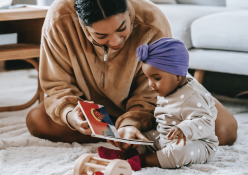Ciska Thurman finds out why it’s important to teach our children the value of solid relationships
 Nobody exists in a vacuum. From the very moment we’re are born, we look to others for support – physical, social, intellectual and emotional. Throughout our lives, we seek social acceptance and compan-ionship. The truth is, we are pack animals and very few of us like to be alone.
Nobody exists in a vacuum. From the very moment we’re are born, we look to others for support – physical, social, intellectual and emotional. Throughout our lives, we seek social acceptance and compan-ionship. The truth is, we are pack animals and very few of us like to be alone.
So is it crucial that we know from a young age how to build strong interpersonal relationships?
Wealth of nations
From primary caregivers, siblings and grandparents, to teachers, friends and – later on – romantic partners and co-workers, different relationships throughout our lives require different management and maintenance.
‘Relationships are organic,’ says Angela Hutchison, a parenting-skills coach. Instead of assigning varying degrees of importance to relation-ships, we as parents should ensure that our children can differentiate between strong, affirming, nurturing relationships, and those ones that are destructive, volatile, hurtful and unhealthy (irrespective of the relational context).
‘Children have been known to cope and perform better in life when they have someone in their corner, supporting them by being on their side and accepting who they are, rather than attempting to change them,’ explains Angela.
Ideally, a secure attachment to the primary caregiver is where this process starts. From babyhood, the success of this non-verbal and emotional relationship enables a child to feel secure enough to develop fully, and affects how they will interact, communicate and form relationships throughout their life.
From the bottom up
This foundation sets the stage for learning other valuable lessons from subsequent relationships.
For example:
• Sibling rivalry demonstrates lessons in sharing (from mom to a favoured toy)
• Grandparents instil a sense of generational perspective
• Friends unmask a variety of individual traits (some good, some bad)
• Teachers create awareness around values such as authority and mutual respect
• Romantic partners teach about vulnerability and accountability
• Co-workers demand friendship alongside professionalism.
Even a relationship with a family pet can inculcate a necessary respect for all living things. But the success of all these experiences relies on having cultivated healthy early relationships.
Keep it healthy
Clear communication is critical to any relationship. So, when you are thinking about how to shape sound interpersonal skills in your child, start with a communication skills audit by asking yourself these two important questions: Is your child a good listener? Is your child able to accurately articulate their feelings?
This will give you some sense of where to start creating or adding to the skills required to be a good son, daughter, brother, sister, friend and so on. Because, ultimately, all relationships are made up of separate individuals wanting to make the relationship entity work – and, urges Angela, they should always be managed based on this premise. In other words, both parties must want to hear and be heard in order for the relationship to grow.
On display
As parents, we are also responsible for modelling healthy relationships – through practice, not perfection. ‘We need to role-model respect for each other, while also expressing our feelings,’ says Angela. Avoiding hypocritical behaviour is key here: always shouting at your children to make yourself heard will simply teach them that this is the only way to communicate.
And, finally, no relationship can succeed without the individuals involved learning conflict-resolution skills. Ironically, butting of heads is commonplace in day-to-day play with children, whereas many adults learn to avoid it at all costs.
Managing disputes in various partnerships throughout one’s life relies on acquiring the following insights: learning to read body language, setting standards and enforcing limits, using language as a problem-solving tool, coping with upsetting emotions constructively, completely avoiding physical or verbal aggression, and exploring different ways to make amends after conflict. Each of these skills is a time-consuming and complex lesson, but introducing them to your child at a young age can make all the difference to their future relationships.
How to develop clear communication skills in your child
Model good listening Kneel to your child’s level, make eye contact, remove distractions and show signs of listening – verbal (spoken responses) or non-verbal (nodding your head).
Verify good listening Encourage your child to repeat back to you, in their own words, what you have said to them. And praise them when they are correct.
Enforce etiquette around interruption Demonstrate courtesy by not interrupting your child when they are speaking. Remind them to allow you to speak fully too.
State your own feelings and thoughts clearly Use ‘I’ instead of ‘you’ (‘I am upset that you didn’t pick up your toys’ versus ‘You’ve made me upset by not picking up your toys’).
Ask probing questions to open up communication Encourage your child to assign ‘feeling words’ to their emotions (‘I’m angry, sad, frustrated, pleased…’), rather than just expressing through actions (walking away or using gestures)







